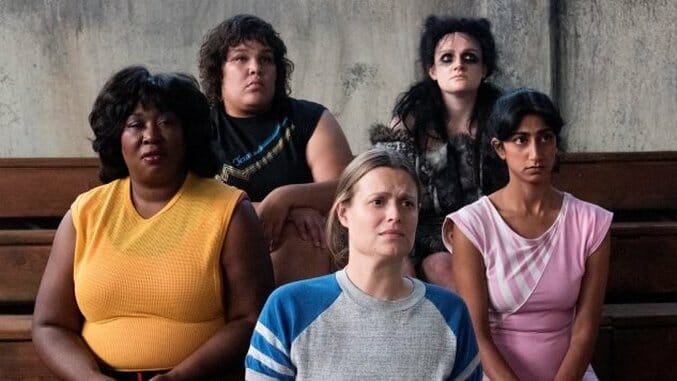GLOW Understands Women’s Wrestling Better Than WWE
Photo courtesy of Netflix
The following contains spoilers for the first season of Netflix’s GLOW.
I was expecting GLOW to be an indictment of everything that was wrong with the wrestling industry in the ’80s—racism, nationalism, sexism—and how it carries over into today, but the camaraderie depicted between a rag tag bunch of women who make up the cast of G.L.O.W. within GLOW shows how out of touch modern portrayals of women’s wrestling are, in World Wrestling Entertainment specifically.
I’ve written about this before, examining the types of relationships shown between women on WWE programming through the lens of shine theory: the idea that ambitious, successful women surrounding themselves with other ambitious, successful women fosters more success, not jealousy and catfights as WWE would have you believe. And though GLOW’s first episode ends with exactly that, as daytime TV actor Debbie (the luminous Betty Gilpin) finds out her best friend and fellow actor Ruth (Alison Brie) has been sleeping with her husband in the middle of Ruth’s audition for G.L.O.W. and a beatdown ensues, it uses its following nine episodes to bring the rest of the Gorgeous Ladies of Wrestling together, slowly mending Debbie and Ruth’s rift as it does.
WWE could stand to learn something from this type of storytelling: women developing friendships, professional alliances and looking out for each other in the workplace. Certainly this is what goes on behind the scenes of WWE’s women’s division, as we see on Total Divas and social media. Obviously there needs to be conflict in wrestling to get audiences invested in the story, and a woman sleeping with another woman’s husband is not only a clear violation of both shine theory and the rules of feminism but lazy storytelling in the vein of WWE. Perhaps a falling out over Debbie getting more prominent roles than Ruth, which is an underlying tension between the two, would have been less predictable and made more sense when Debbie comes to work at G.L.O.W. as their top babyface to Ruth’s burgeoning heel. Their initial beef aside, it’s clear how much Ruth, Debbie and the rest of the G.L.O.W. roster thrive on learning wrestling and creating something special with each other. Even where women in wrestling don’t get along, on screen or otherwise, it’s this undercurrent of professional respect—also present in Charlotte’s feud with Sasha Banks last year—that WWE could stand to take note of.
-

-

-

-

-

-

-

-

-

-

-

-

-

-

-

-

-

-

-

-

-

-

-

-

-

-

-

-

-

-

-

-

-

-

-

-

-

-

-

-








































